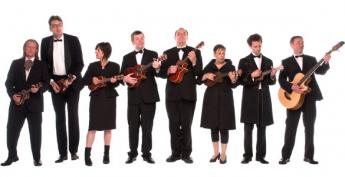Search
Rychard Carrington reports on the Ukulele Orchestra of Great Britain – Cambridge Corn Exchange, 18 July 2008

One warms to the Ukulele Orchestra of Great Britain from the start. Six men and tuxedos and one smartly dressed woman (Kitty Lux being absent on this occasion), all but one playing a small instrument with primarily comic connotations. The other plays a bass guitar, which he insists is actually a bass ukulele, on account of its having four strings. And that’s it: no technological embellishment: all our entertainment tonight will be provided by seven smartly-dressed, beseated individuals and their diminutive stringed instruments. Within a few seconds of their entrance, you pick up on their polite but very clever humour, and you know that you really like them.
While the Orchestra’s devotion to their instrument is clearly sincere, their musicianship in earnest, the comic connotations – and the formidably keen collective personal wit - lead them into what amounts to a musical comedy show. Yet, as with all good musical comedy, much of the attraction actually rests in the genuine appeal of the music. The sound of massed ukuleles is jaunty and quirky, so it goes with humour, but is also a real musical pleasure in its own right.
The majority of their numbers are reworkings of well-known songs and tunes. These aren’t merely rescored for ukuleles, but transfigured into completely different styles. Thus two highlights were a folk-cum-swing version of Wuthering Heights, and a breezy Simon-and-Garfunkelsque Anarchy In The UK. These mutations invariably worked superbly. Hoary old chestnuts were revitalised, liberated: the irreverent revisions actually increased my respect for the originals.
Although classical and jazz and older popular music feature, a further twist to the Orchestra’s endearingly strange essence is that they are well-versed in the history of rock, while presenting themselves with a manner more akin to old-fashioned entertainers for respectable audiences such as Flanders and Swann, whom you might expect to hardly acknowledge pop trends beyond Frank Sinatra. In a sense they undermine the rock revolution that rendered such style staid, reclaiming a kind of dignity and sincerity as they burlesque anthems of rock rebellion long since rendered common cultural diet – Anarchy In The UK, Teenage Kicks, Back In Black, Pinball Wizard, Rock Around The Clock, Teenage Dirtbag - transforming them into jolly smile-along ditties. Pinball Wizard – delivered a cappella, without even ukuleles – was perhaps my very favourite. Rather than deriding these songs, the Ukes accept them into their world, generously transforming them into fresh, innocent delights. They enunciate lyrics clearly, usually more clearly than in the originals, exposing the words to our scrutiny; yet whether we find these to be clever or daft, we warm to them. Through transformation comes reevaluation: the Ukes render Yes Sir, I Can Boogie on a par with the far more critically–respected disco-funk of Theme From Shaft and Le Freak. Removing songs from their cultural contexts and self-conscious attitudes, the Orchestra’s friendly comedy restores to music the simple pleasure of a good tune played well.
Their inter-song banter is equally superb, sharply drawing fresh humour out of standard conventions of live entertainment: ‘I’d like to introduce the members of the band: Dave, the bloke sitting next to you is called Peter.’
While the direction of the humour might be hard to dissect and the exact degree of seriousness of the musical appeal hard to discern (in any case, only critics need bother about such issues), the high quality of what the Ukes do is as evident as its originality. In their oddly distinct way, they are tremendous performers: you leave with a sense of having been privileged to witness greats in action, and with an equally rare sense of having been most thoroughly entertained.
Writer: Rychard Carrington